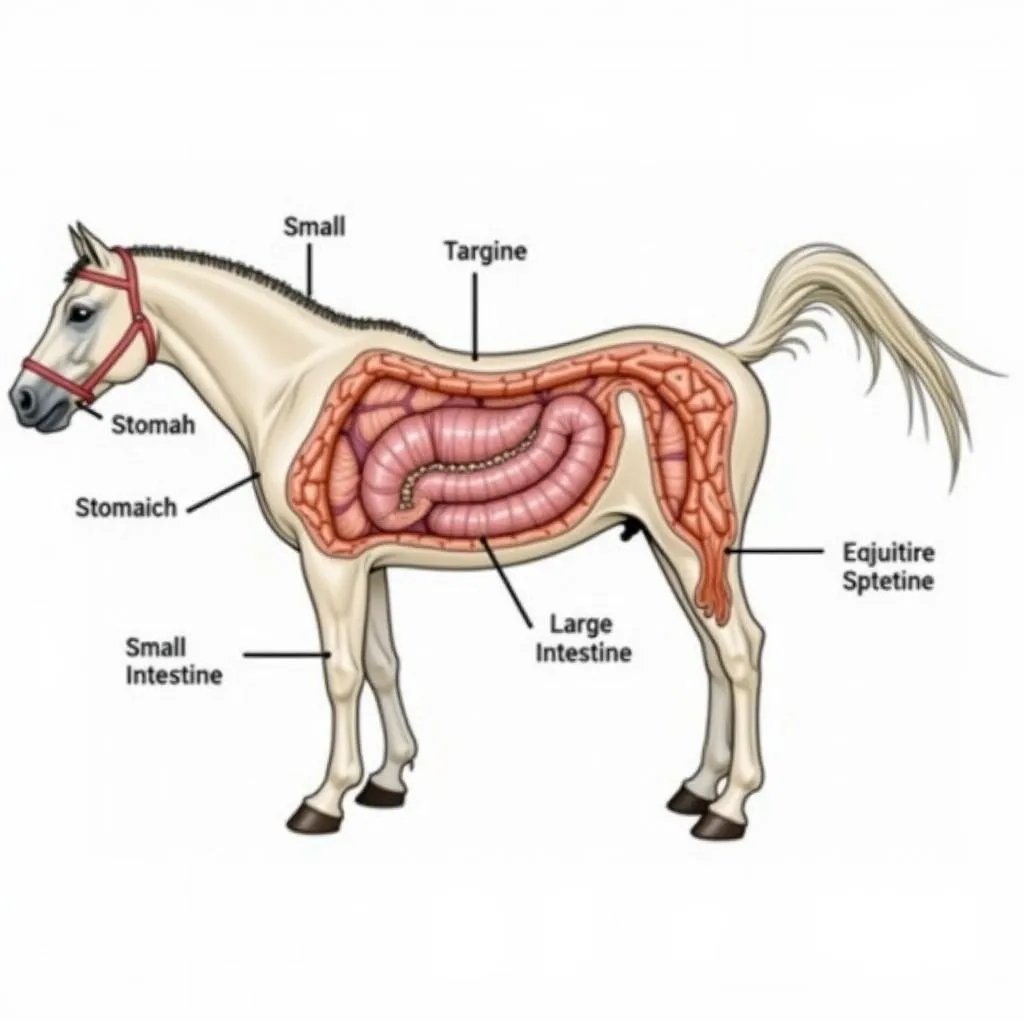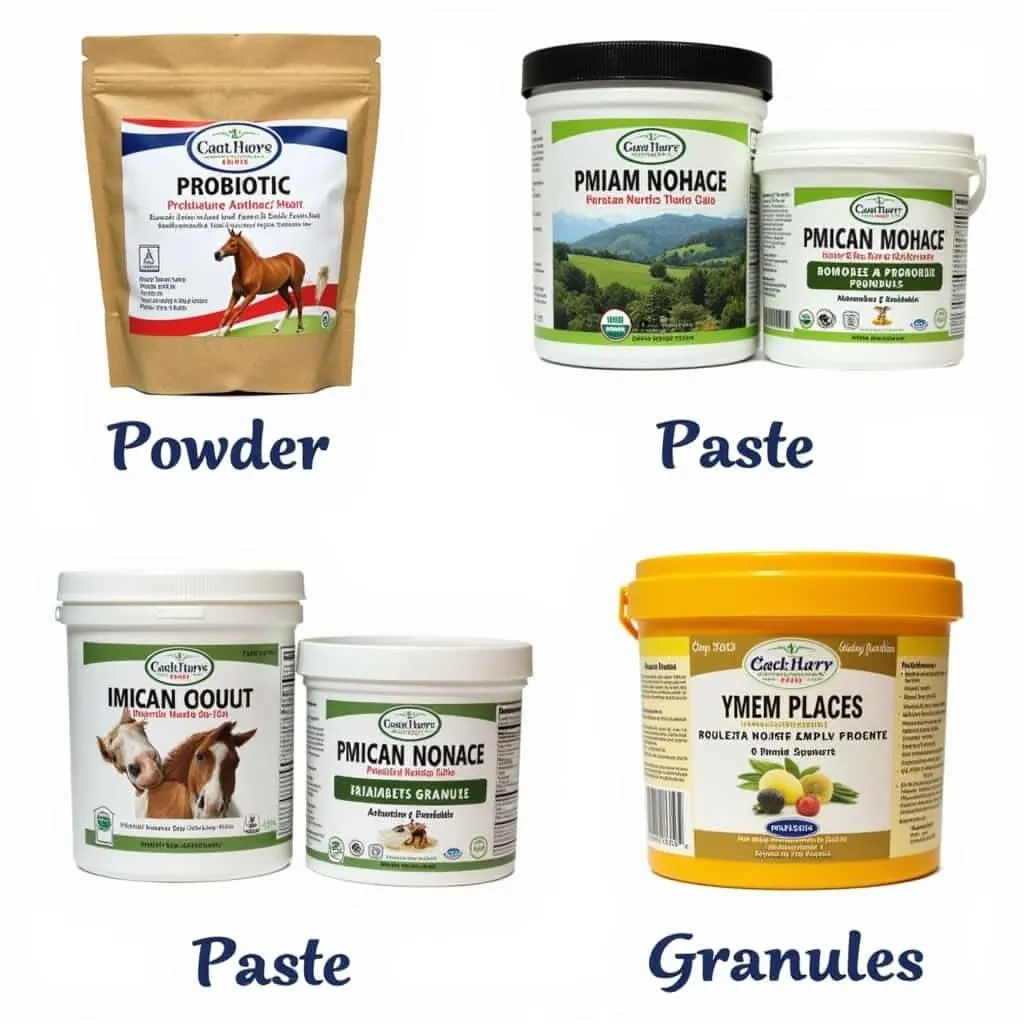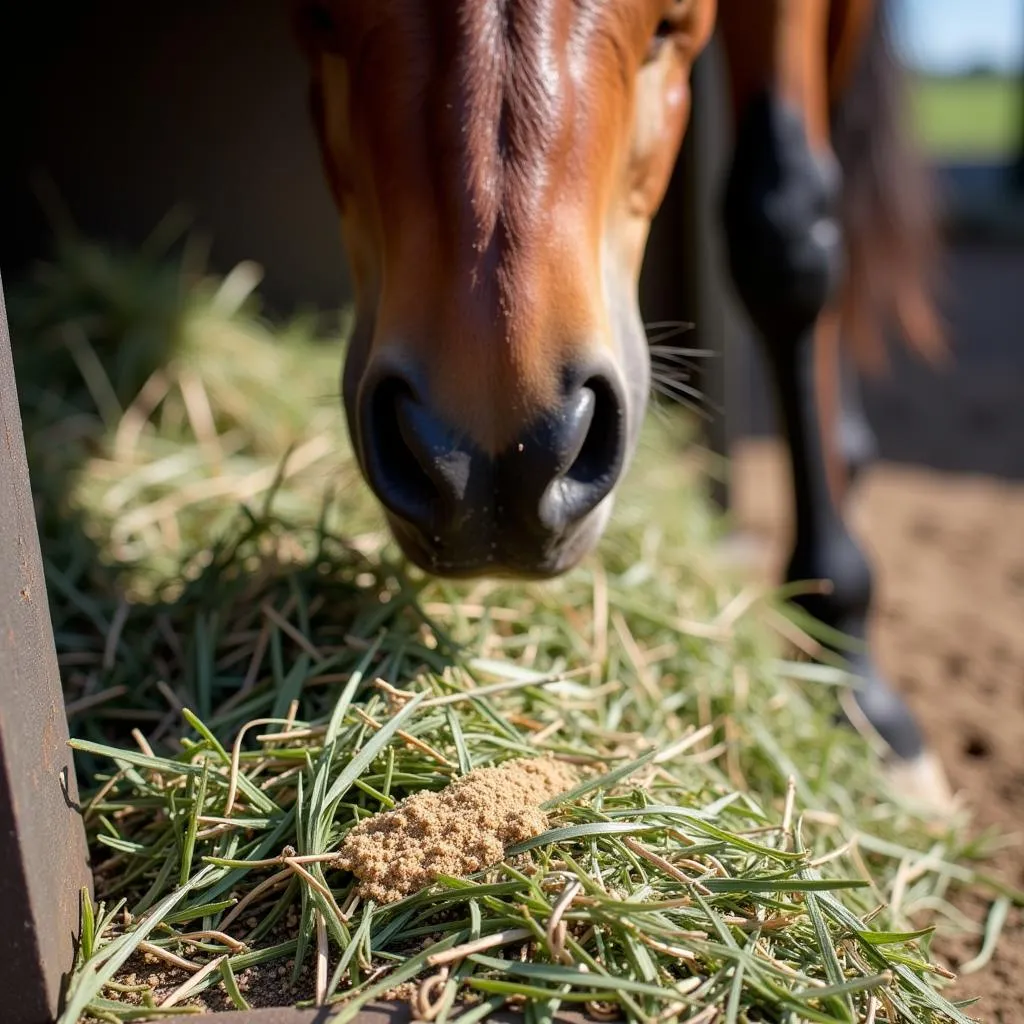Probiotics for horses are becoming increasingly popular as horse owners recognize the crucial role a healthy gut plays in their animals’ overall well-being. But what exactly are probiotics, and how can they benefit your equine companion? This comprehensive guide delves into the world of equine probiotics, exploring their benefits, uses, and how to choose the right supplement for your horse’s specific needs.
 Horse Digestive System Illustration
Horse Digestive System Illustration
Understanding the Equine Digestive System and the Importance of Gut Health
Horses have a unique digestive system, classified as non-ruminant herbivores. Unlike ruminants like cows, which have multi-compartment stomachs, horses have a single stomach and rely heavily on their hindgut (cecum and colon) for fiber fermentation. This complex process involves a delicate balance of microorganisms, including bacteria, fungi, and protozoa, which break down plant material and release nutrients.
When this delicate balance is disrupted, it can lead to a range of digestive issues, including colic, diarrhea, laminitis, and poor nutrient absorption. Maintaining a healthy gut microbiome is therefore essential for your horse’s overall health, performance, and well-being.
What are Probiotics for Horses?
Probiotics are live microorganisms that, when administered in adequate amounts, confer a health benefit to the host. In simpler terms, they are beneficial bacteria that help maintain a healthy balance of microbes in the gut. While often associated with yogurt and other fermented foods for humans, probiotics are also available in various forms for horses, including powders, pastes, and granules.
 Different Types of Equine Probiotics
Different Types of Equine Probiotics
The Benefits of Probiotics for Horses
Probiotics offer a wide range of potential benefits for horses, including:
- Improved Digestion and Nutrient Absorption: Probiotics help break down fiber and other nutrients, making them more available for the horse to absorb.
- Reduced Risk of Digestive Upsets: By maintaining a healthy balance of gut bacteria, probiotics can help prevent diarrhea, colic, and other digestive issues.
- Enhanced Immune Function: A significant portion of the horse’s immune system resides in the gut. Probiotics help strengthen this immune response.
- Reduced Stress and Anxiety: Studies have shown a link between gut health and stress levels in horses.
- Improved Coat and Hoof Condition: A healthy gut translates to a healthy horse overall, often reflected in a shiny coat and strong hooves.
When to Consider Giving Your Horse Probiotics
While probiotics are generally safe for most horses, there are specific situations where they can be particularly beneficial:
- During and After Antibiotic Use: Antibiotics can disrupt the natural balance of bacteria in the gut. Probiotics can help restore this balance and prevent antibiotic-associated diarrhea.
- During Times of Stress: Traveling, competition, or changes in routine can stress a horse, potentially leading to digestive upset. Probiotics can help mitigate these effects.
- Dietary Changes: Introducing new feeds or making significant changes to a horse’s diet can disrupt the gut microbiome.
- Recovery from Illness or Surgery: Illness and surgery can compromise a horse’s immune system and digestive health, making probiotics a valuable tool for recovery.
 Horse Eating Hay with Probiotic Supplement
Horse Eating Hay with Probiotic Supplement
Choosing the Right Probiotic for Your Horse
The world of equine probiotics offers a vast array of options, each with different strains of bacteria and intended benefits. When choosing a probiotic for your horse, consider these factors:
- Type of Probiotic: Different strains of bacteria offer different benefits. Research which strains are most beneficial for your horse’s specific needs.
- Product Form: Probiotics come in various forms, including powders, pastes, and granules. Choose a form that is easy to administer and palatable for your horse.
- Dosage: Follow the manufacturer’s recommended dosage guidelines.
- Quality and Reputability: Select a reputable brand with high-quality ingredients and manufacturing processes.
Incorporating Probiotics into Your Horse’s Diet
Adding a probiotic supplement to your horse’s diet is generally straightforward. Most products can be sprinkled over feed or mixed with water.
“Always consult with your veterinarian before starting your horse on any new supplements, including probiotics,” advises Dr. Emily Carter, DVM, specializing in equine nutrition and digestive health. “They can help you determine the appropriate probiotic and dosage for your horse’s individual needs.”
Conclusion
Probiotics offer a natural and effective way to support your horse’s digestive health, immune function, and overall well-being. By understanding the benefits, uses, and selection criteria for equine probiotics, you can make informed decisions to promote a long and healthy life for your equine companion.
Remember, a healthy gut is a happy gut, and a happy gut often translates to a happy and healthy horse.
Frequently Asked Questions about Probiotics for Horses:
- Can I give my horse human probiotics? It is not recommended to give horses human probiotics, as the strains of bacteria and dosage requirements may differ significantly.
- How long does it take for probiotics to work in horses? The time it takes for probiotics to show noticeable benefits can vary depending on the horse and the reason for supplementation. Some horse owners report positive changes within a few days, while others may take a few weeks.
- Do probiotics need to be refrigerated? Storage recommendations vary depending on the specific product. Always refer to the manufacturer’s instructions for proper storage.
Need more information or assistance with your horse’s health and nutrition? Contact our expert team at Justus Horses USA: Phone: 0772127271, Email: [email protected] Or visit us at: QGM2+WX2, Vị Trung, Vị Thuỷ, Hậu Giang, Việt Nam. We’re available 24/7 to answer your questions and provide personalized guidance.